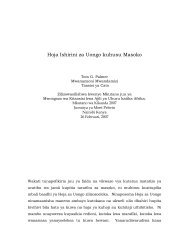Preventing Electoral Fraud report SAIRR May 11 ... - AfricanLiberty.org
Preventing Electoral Fraud report SAIRR May 11 ... - AfricanLiberty.org
Preventing Electoral Fraud report SAIRR May 11 ... - AfricanLiberty.org
Create successful ePaper yourself
Turn your PDF publications into a flip-book with our unique Google optimized e-Paper software.
There also needs to be far greater transparency in the way the ZEC conducts its business<br />
and its electoral administration in general. During the parliamentary elections of March<br />
2008, the ZEC seemed to be paralysed by the prospect of a possible MDC victory and<br />
simply clammed up. Rumours of every kind swept the country because the ZEC had<br />
failed in its task to provide authoritative information as speedily as possible. Then, when<br />
the parliamentary results were announced, they were released at a snail's pace and over a<br />
day or more. Further, each MDC victory was accompanied by a partnering Zanu-PF<br />
victory, apparently with the intention of creating the impression of a virtually tied race.<br />
Yet the fact – as must have been obvious from early on – was that the MDC had won a<br />
decisive victory. A similar attempt to mask the results of the presidential first round<br />
merely undermined the credibility of the ZEC further still.<br />
The Background: Gaining Access to the Voters' Roll<br />
For free and fair elections to take place (at last) in Zimbabwe, it is essential that the ZEC<br />
be constituted impartially, that it operate independently of all parties, and that it be<br />
effective. Similarly, it is vital that an accurate voters' roll be drawn up at last. This must<br />
be free from the partisan control and manipulation of the past, have credibility for all<br />
political parties, and be easily accessible to the general public.<br />
This last point is worth stressing. In the past the voters' roll has been shrouded in a<br />
habitual secrecy as if it were a grave matter of national security. Attempts to gain access<br />
to it have been treated with contempt, and every possible obstruction has been placed in<br />
the path of those attempting to exercise what ought to be their normal citizen rights to full<br />
and easy access to the roll.<br />
This Report is unique in that it is based on a full examination of the actual voters' roll as<br />
it stood in October 2010. Hitherto, the only information available on the current roll was<br />
that provided in January 20<strong>11</strong> by the Zimbabwe Election Support Network (ZESN), a<br />
coalition of non-governmental <strong>org</strong>anisations (NGOs). But the ZESN <strong>report</strong> 4 was based on<br />
a sample survey of a mere 513 people from a “hard” (printed) copy of the roll.<br />
For this Report, by contrast, we have worked on the full roll in digital format, which has<br />
enabled a far more comprehensive and authoritative evaluation.<br />
When the ZESN Report was released, it was admitted on all sides – including by Mr<br />
Tobaiwa Mudede, the Registrar-General – that the roll was “in a shambles”. The ZEC<br />
called upon Mr Mudede to explain, and then gave him three months to “fix” the roll. This<br />
expectation was ridiculous, in terms of both the time and the personnel required. Quite<br />
clearly, an entirely new roll needed to be drawn up, a task not easily performed in three<br />
months. In addition, the last person to whom such a task could be entrusted was the very<br />
man seemingly responsible for various defective rolls in the past.<br />
4<br />
ZESN, A Report on a Voters' Roll Observation Conducted in Zimbabwe (Harare), cyclostyled,<br />
January 20<strong>11</strong><br />
12



